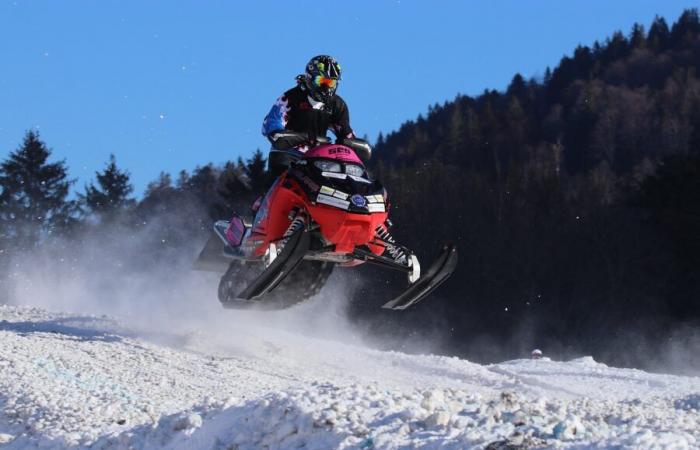Orcières, Dévoluy, Montgenèvre, Serre-Chevalier… there are many ski areas that offer snowmobile rides as a leisure activity. A practice that has been banned in France by a law included in the Environmental Code since 1991. In a case between the company Espace Gliss and the France Nature Environnement Isère and Mountain Wilderness associations, the Court of Cassation issued a ruling on November 19 confirming their illegality in the Chamrousse ski area. A decision likely to undermine the challenges to this law regularly made by recreational snowmobile professionals.
Mountain ecosystems are rich, but sensitive. Particularly in winter, where emblematic species such as the black grouse and the mountain hare reclaim the ski areas at the end of the day, when human attendance decreases. “Each additional disturbance imposes [à la faune] to draw on its reserves to get through this critical winter period, explains the French Office for Biodiversity on its website, specifying that motorized vehicles such as snowmobiles, by allowing easy access to remote areas where wildlife enjoys peace and quiet, directly compromise their ability to survive. »
Since 1991, the Environmental Code has strictly regulated the use of machines designed for moving on snow in ski areas. 1991 is precisely the year of the birth of the first defense union for snowmobile professionals, the SNPQM. During a mobilization in Gap on September 19, Christophe Tison, the president of the National Union of Quad and Snowmobile Professionals, gave his point of view to the prefecture. The reading of the law made by its services would be “too strict”seee “ideological”. According to their lawyers, certain municipalities offer this activity by being “totally in order”.
With this judgment of the Court of Cassation, the position of the SNPQM will now be difficult to defend, according to Vincent Neirinck, “Mountain Protection” referent for the Mountain Wilderness association.
The law provides for two exceptions to this ban, it is the small “kart” style circuit at the foot of the station in which you make serpentines in a demarcated, fenced area, with a single entrance and which is specifically dedicated and authorized for That. And there is also the recent possibility of transporting customers with snowmobiles or snow groomers to certain high-altitude restaurants which have obtained specific authorization for this and under very very specific conditions, in particular which prohibit customers from drive, because it is a transport offer and not a leisure, hiking or strolling offer. But in this context, a certain number of operators still offer snowmobile rides, often on the slopes at the end of the day with an agreement with the town hall or the ski lift operator. Under cover of this authorization issued they say “I have the right”. And this is ultimately what this judgment of the Court of Cassation makes clear: “no, you do not have the right to use a snowmobile for leisure purposes, including at the end of the evening on the ski areas for you stroll »
In recent years, groomer rides have flourished when the slopes are closed. These are also covered by the Environmental Code and the judgment of the Court of Cassation, recalls Vincent Neirinck.
It's exactly the same thing, the law does not speak of snowmobiles but of machines designed for progress on snow. So whether it's a quad, an assault tank or a snow groomer you don't have the right so it's settled from that point of view.
For the case of Chamrousse to serve as an example, Mountain Wilderness contacted several mountain prefects to point out the fact that “the law East more and more confirmede by the various judicial authorities. »
In the Hautes-Alpes, FNE PACA and its departmental branch, the SAPN, brought a similar case before the Marseille administrative court. In 2018, the mayor of the town of Orcières had his municipal council validate an agreement to provide a snowmobile circuit in the ski area. Due to a lack of reaction from state services, the associations filed an appeal. The judgment of the Court of Cassation today confirms the SAPN FNE 05 in what it thinks, Bernard Patin explains to ram05, namely that “the practice of Dévoluy, Montgenèvre, Serre-Chevalier, is totally illegal. The association is now awaiting the decision of the Marseille court for the Orcières case because if it has chosen to tackle this particular case, the SAPN FNE 05 hopes that it will set a precedent, and then intends to ask the services of the State to go to verbalize illegal practices.
If Mountain Wilderness is uncompromising on these practices, it is also because it considers them to be in contradiction with the ski areas' stated commitments to reduce their environmental impact, explains Vincent Neirinck.
The mountain is one of the last natural spaces of silence and beauty that can be offered on a European scale. 80 to 80% of us live in the city. The mountain is ultimately this last refuge. It should not be made a constraint but an opportunity. Resorts are starting to understand this, as are the issues linked to climate change. We have actions that are carried out to minimize the environmental impact [dans les stations]so there is a real coherence in not encouraging visitors to go there by virtuous bus to put them on a snowmobile whirring in the middle of the mountain as soon as they have disembarked from their virtuous means of transport. […] We cannot say that we must make great efforts to limit greenhouse gas emissions and continue to do motorized leisure activities across all the mountains.






